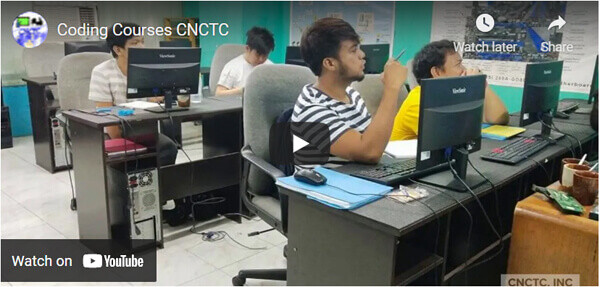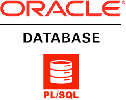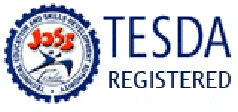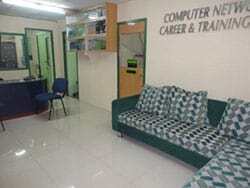
Key Features – Live Online
- 4 days Instructor-Led Live Online Classroom
- Webex Virtual Class for interactive near classroom experience
- Access to Remote Lab PC for Hands-On activities
- Unlimited Practice exams
- Integrated Courseware in the Learning Management System
- Step by Step guide for challenging hands-on lab activities
- Flexible Schedules – Both Weekdays and Weekends Classes
- Get Trained by Oracle Databases PL/SQL Expert Trainer with Over 15 Years of Industry Experience
- No. 1 Training Center for Oracle Databases PL/SQL Courses
- E-learning Access for Pre-course and Post Training Support
- Best Price Guaranteed for Oracle Databases PL/SQL Courses
Key Features – Face to Face
- 3 days Instructor-Led Face to Face Classroom training
- We are a TESDA Registered Training Center
- Offering Flexible Schedules – Both Weekdays and Weekends Classes
- Get Trained by Oracle Databases PL/SQL Expert Instructor with Over 15 Years of Industry Experience
- No. 1 Training Center for Oracle Databases PL/SQL Courses
- We Guarantee Best Price for Oracle Databases PL/SQL Courses
Key Features – 1 on 1
- Gain the technical skills needed in the workplace. 1 on 1 training is the best way to learn
- Quickest way to master any of our course offerings.
- Experience superb hands-on laboratory activities and unobstructed attention from your trainer.
- Guaranteed to start the Training
TRAINEE FEEDBACKS
ABOUT THE COURSE:
This course will teach you all you need to know about PL/SQL language using Oracle Databases. It covers basic to advanced programming topics. You will learn how to use the PL/SQL language to manage your companies oracle database. This will definitely enhance your skills in PL/SQL programming
COURSE DELIVERY:
Instructor-led, classroom/laboratory-delivery learning model with structured hands-on and minds-on activities and laboratory activities.
ENTRY REQUIREMENTS:
Basic computing knowledge. Suggested course to take first MySQL Database for Beginners
EMPLOYMENT OBJECTIVES
Upon completion of the course, trainees will be qualified to be a database administrator, database developer or database architect
COURSE CURRICULUM
Oracle Databases PL/SQL Language References Syllabus
- Advantages of PL/SQL
- Main Features of PL/SQL
- Architecture of PL/SQL
- Character Sets and Lexical Units
- Declarations
- Naming Conventions
- Scope and Visibility of PL/SQL Identifiers
- Assigning Values to Variables
- PL/SQL Expressions and Comparisons
- PL/SQL Error-Reporting Functions
- Using SQL Functions in PL/SQL
- Conditional Compilation
- Predefined PL/SQL Numeric Data Types and Subtypes
- Predefined PL/SQL Large Object (LOB) Data Types
- User-Defined PL/SQL Subtypes
- PL/SQL Data Type Conversion
- Overview of PL/SQL Control Structures
- Testing Conditions (IF and CASE Statements)
- Sequence Control (GOTO and NULL Statements)
- Understanding PL/SQL Collection Types
- Choosing PL/SQL Collection Types
- Defining Collection Types
- Declaring Collection Variables
- Initializing and Referencing Collections
- Referencing Collection Elements
- Assigning Values to Collections
- Comparing Collections
- Using Multidimensional Collections
- Using Collection Methods
- Avoiding Collection Exceptions
- Defining and Declaring Records
- Using Records as Subprogram Parameters and Function Return Values
- Assigning Values to Records
- Description of Static SQL
- Managing Cursor in PL/SQL
- Querying Data with PL/SQL
- Using Subqueries
- Using Cursor Variables (REF CURSORs)
- Using Cursor Expressions
- Overview of Transactions Processing in PL/SQL
- Doing Independent Units of Work with Autonomous Transactions
- When you need Dynamic SQL
- Using Native Dynamic SQL
- Using DBMS_SQL Package
- Avoiding SQL Injection in PL/SQL
- Overview of PL/SQL Subprograms
- Subprogram Parts
- Creating Nested Subprograms that Invoke Each Other
- Declaring and Passing Subprogram Parameters
- Overloading PL/SQL Subprogram Names
- How PL/SQL Subprogram Calls are Resolved
- Using Invoker’s Right or Definer’s Rights (AUTHID Clause)
- Using Recursive PL/SQL Subprograms
- Invoking External Subprograms
- Controlling Side Effects of PL/SQL Subprograms
- Understanding PL/SQL Subprogram Parameter Aliasing
- Using the PL/SQL Function Result Cache
- Overview of Triggers
- Guidelines for Designing Triggers
- Privileges Required to Use Triggers
- Creating Triggers
- Coding the Trigger Body
- Compiling Trigger
- Modifying Trigger
- Debugging Triggers
- Enabling Triggers
- Disabling Triggers
- Viewing Information About Triggers
- Examples of Trigger Application
- Responding to Database Events Through Triggers
- What is PL/SQL Package?
- What goes in a PL/SQL package?
- Advantages of PL/SQL Packages
- Understanding the PL/SQL Package Specification
- Referencing PL/SQL Contents
- Understanding the PL/SQL Package Body
- Example of PL/SQL Package Features
- Private and Public Items in PL/SQL Packages
- How STANDARD Package Defines the PL/SQL Environment
- Overview of Products-Specific PL/SQL Packages
- Overview of PL/SQL Run-Time Error Handling
- Guidelines for Avoiding and Handling PL/SQL Errors and Exceptions
- Advantages of PL/SQL Exceptions
- Predefined PL/SQL Exceptions
- Defining Your Own PL/SQL Exceptions
- How PL/SQL Exceptions Are Raised
- How PL/SQL Exceptions Propagate
- Re-raising a PL/SQL Exception
- Handling Raised PL/SQL Exceptions
- Overview of PL/SQL Compile-Time Warnings
- How PL/SQL Optimizes Your Programs
- Guidelines for Avoiding PL/SQL Performance Problems
- Collecting Data about User-Defined Identifiers
- Profiling and Tracing PL/SQL Programs
- Reducing Loop Overhead for DML Statements and Queries with Bulk SQL
- Writing Computation-Intensive PL/SQL Programs
- Tuning Dynamic SQL with EXECUTE IMMEDIATE Statement and Cursor Variables
- Tuning PL/SQL Subprogram Calls with NOCOPY Hint
- Compiling PL/SQL Units for Native Execution
- Performing Multiple Transformations with Pipelined Table Functions
- Assignment Statement
- AUTONOMOUS_TRANSACTION Pragma
- Block
- CASE Statement
- CLOSE Statement
- Collection
- Collection Method Call
- Comment
- Constant
- CONTINUE Statement
- Cursor Attribute
- Cursor Variable Declaration
- EXCEPTION_INIT Pragma
- Exception Declaration
- Exception Handler
- EXECUTE IMMEDIATE Statement
- EXIT Statement
- Explicit Cursor
- Expression
- FETCH Statement
- FORALL Statement
- Function Declaration and Definition
- GOTO Statement
- IF Statement
- INLINE Pragma
- Literal
- LOOP Statements
- NULL Statement
- OPEN Statement
- OPEN-FOR Statement
- Parameter Declaration
- Procedure Declaration and Definition
- RAISE Statement
- Record Definition
- RESTRICT_REFERENCES Pragma
- RETURN Statement
- RETURNING INTO Clause
- %ROWTYPE Attribute
- SELECT INTO Statement
- SERIALLY_REUSABLE Pragma
- SQL (Implicit) Cursor Attribute
- SQLCODE Function
- SQLERRM Function
- %TYPE Attribute
- Variable
- ALTER FUNCTION Statement
- ALTER PACKAGE Statement
- ALTER PROCEDURE Statement
- ALTER TRIGGER Statement
- ALTER TYPE Statement
- CREATE FUNCTION Statement
- CREATE PACKAGE Statement
- CREATE PACKAGE BODY Statement
- CREATE PROCEDURE Statement
- CREATE TRIGGER Statement
- CREATE TYPE Statement
- CREATE TYPE BODY Statement
- DROP FUNCTION Statement
- DROP PACKAGE Statement
- DROP PROCEDURE Statement
- DROP TRIGGER Statement
- DROP TYPE Statement
- DROP TYPE BODY Statement
COURSE FEE
COURSE SCHEDULES
4 days / 9am - 5pm (32hrs)

Call Us for more information
Tel: (+632) 8285-2936 / (+632) 8736-2032
SMART: 09204282022 / 09603525900
GLOBE: 09773282627 / 09563346864
Request Course Quotation
Take advantage of CNCTC 's latest interactive Instructor-Led Live Online Training. Online Courses are delivered using WebEx to bring the classroom to your home or at your workplace and can be accessed directly on your own computer with an internet connection. By using Cisco’s WebEx, and integrating our Computer lab facilities, we can provide a near-classroom experience remotely to your own location of choice. Register Now!







